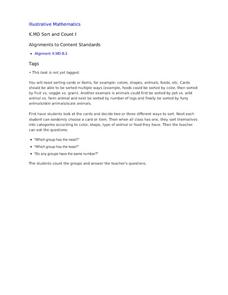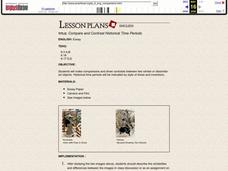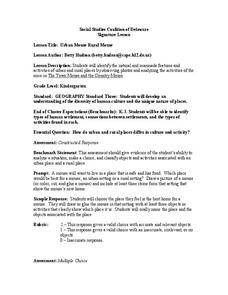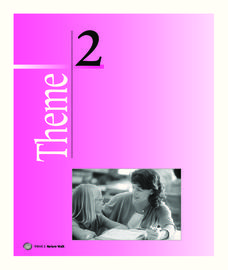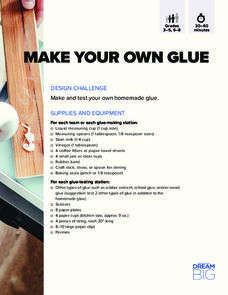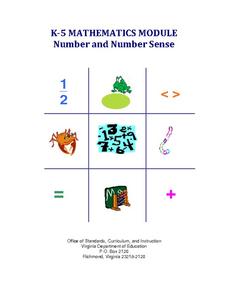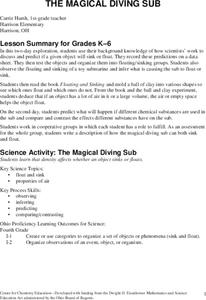Illustrative Mathematics
Which Number is Greater? Which Number is Less? How do you Know?
When comparing groups of objects, it's easy for children to identify which has more, but it's not so easy for them to explain their reasoning. This simple whole-group activity provides multiple opportunities for learners to compare...
Illustrative Mathematics
Which Weighs More? Which Weighs Less?
Expand the the comparative language of young mathematicians with a hand-on weight measurement activity. Working independently or in pairs, children compare the weight of large wooden blocks to various other classroom objects, recording...
Illustrative Mathematics
Sort and Count
Young mathematicians are on their feet and moving around in this primary grade sorting activity. After giving each child an object or picture card, they then sort themselves into groups, counting to see which has the most or least...
Curated OER
Compare and Contrast Historical Time Periods
What do images tell us about history? Dress, setting, and actions all convey cultural norms, and in essence, give reference to historical time and place. Learners compare and contrast Kunisada's Actor with Flute in Snow to Hokuei's...
Illustrative Mathematics
Longer and Heavier? Shorter and Heavier?
For many young children it seems obvious that longer objects are heavier than shorter objects. This assumption is put to the test as the class investigates the relationship between length and weight in a whole-group activity. Using a...
Digital Public Library of America
Teaching Guide: Exploring Little Women
Louisa May Alcott's Little Women is a literary masterpiece as well as a timestamp of the formative mid-nineteenth century in America. Using a primary source set of photographs, letters, and portraits, readers discuss the ways...
Illustrative Mathematics
Money in the Piggy Bank
It's time to crack open that piggy bank and see what's inside. First, count up the pennies, nickels, dimes, and quarters, identifying what fraction of them are dimes. Then calculate the total value of the coins, writing another fraction...
Social Studies Coalition of Delaware
Urban Mouse Rural Mouse
Explore rural and urban environments over the course of four days. Each day offers a new look into how both environment compare and contrast. Activities include the observation and analyzation of images, a read aloud and grand discussion...
Houghton Mifflin Harcourt
Nature Walk: Extra Support Lessons (Theme 2)
Reinforce concepts such as long vowels, spelling patterns, sound clusters, double-final consonants, and syllables with a nature-themed unit. Through a series of extra support lessons, learners compare and contrast using a...
Curated OER
Measuring to the Nearest Foot
Second graders measure and record the length of five different objects around the room. They watch as the teacher measures items using a ruler. A ruler is a foot long. Everyone listens and watches as the teacher continues to teach that a...
DiscoverE
Make Your Own Glue
You won't regret being stuck with this activity. By mixing a variety of household items, pupils create their own glue. They test the tensile strength of their glue and compare it to that of other adhesives.
Curated OER
K-5 Mathematics Module: Number and Number Sense
Reinforce number sense with a collection of math lessons for kindergarteners through fifth graders. Young mathematicians take part in hands-on activities, learning games, and complete skills-based worksheets to enhance proficiency...
Laboratory for Atmospheric and Space Physics
Jupiter’s Relative Size
How do you properly illustrate the extreme size difference between two planets—Earth and Jupiter? With the help of jellybeans, of course! Create a scale model of Jupiter's mass compared to Earth using a fishbowl, 1,400 beans, and a...
Curated OER
Science: Floating and Sinking Objects
Second graders discuss why some objects float while others sink. They examine various objects and predict whether or not they will sink or float. Students discover the properties needed for objects to float.
media.yurisnight.net
Science Lesson Plan: Our Solar System: I Wonder?
Ever wonder why Pluto isn't considered a planet? Or how large the Earth is compared to the other inner planets? Explore the universe with a series of projects that simulate different aspects of our solar system. The activities require...
ProCon
Minimum Wage
The first ever minimum wage in America was set at 25 cents per hour in 1938 and has been steadily, if slowly, increasing ever since. Using the provided website, pupils decide if the United States should further increase the federal...
Curated OER
Region Reality
Eighth graders compare and contrast world regions and explore the theme of world regions. In this world geography lesson, 8th graders name regions in the U.S. and mark them on a map. Students discuss the cultural and physical...
Curated OER
Comparing Matter
Students use Internet to research and discover states of matter and explain how molecules are arranged in each state, complete Comparing Matter Work Sheet, and identify objects around classroom that fit three states of matter definitions.
Center for Learning in Action
Introduction to the States of Matter
Liquids, gases, and solids are the states of matter in which scholars investigate in a lesson plan that offers in-depth information and engaging activities that look into the three states and the changes their properties make when mixed...
Curated OER
Discovering Pi/Welcome to Pi Day
Learners explore pi. In this circle measurement lesson, students define and identify radius, diameter, circumference, and perimeter. Learners work in groups to measure several plastic lids and record their findings. Students compare the...
Curated OER
The Magical Diving Sub
First graders discuss and predict if a given object sinks or floats. They record their predictions on a data sheet. Pupils test the objects and organize them into floating/sinking groups. Students observe the floating and sinking of a...
Gwinnett County Public Schools
Analysis of the Tuck Everlasting and The Birchbark House Text Exemplars
Looking to introduce some text-based questions into your ELA lessons? Practice the kinds of skills the Common Core demands with the seven text-based questions and the essay prompt provided here. Designed to be a three-day lesson, day one...
Rainforest Alliance
My Forest or the Rainforest?
The differences between tropical and temperate rainforests range from animals and flowers to climate and landscapes. Kindergarteners compare and contrast characteristics of their local forest to a tropical rainforest.
Center for Learning in Action
Density
Explore the concept of density within states of matter—gases, liquids, and solids—through a group experiment in which young scientists test objects' texture, color, weight, size, and ability to sink or float.


